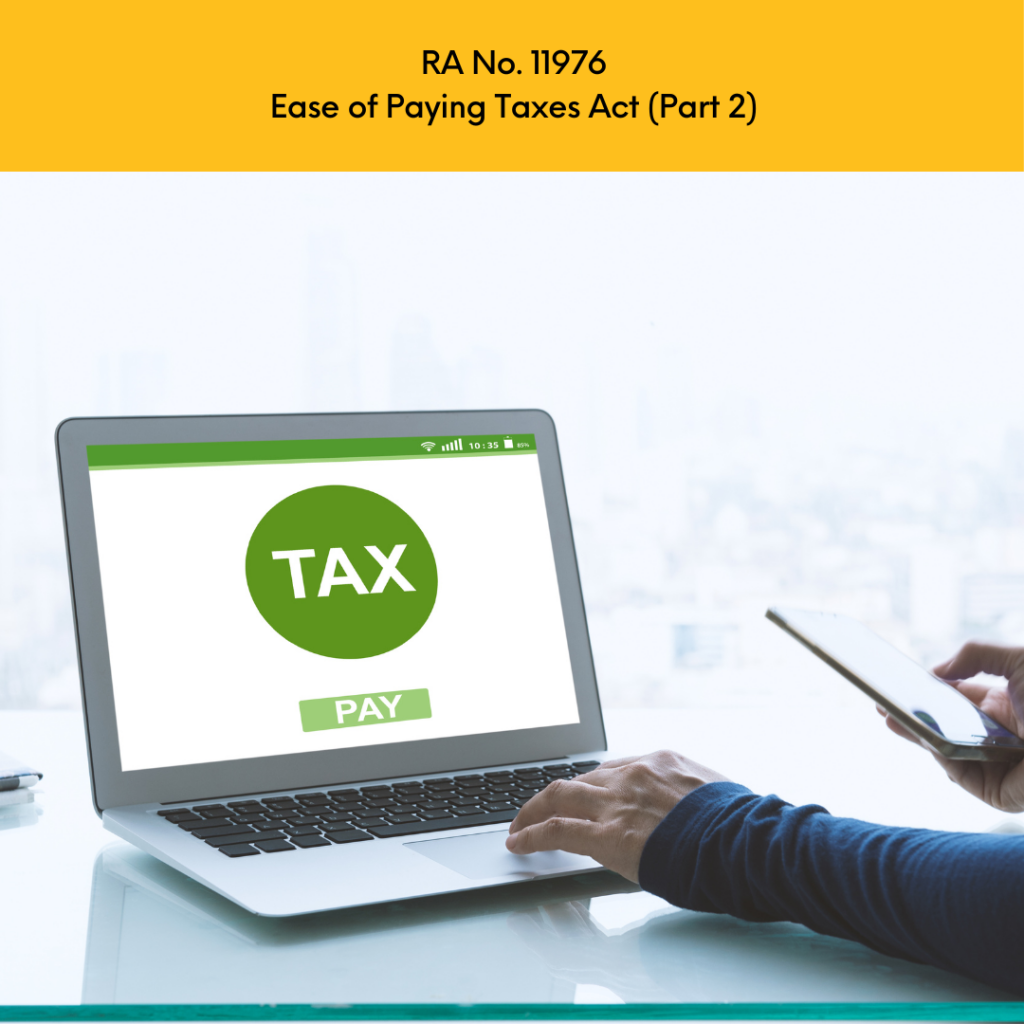
Published 19 January 2024, The Daily Tribune
Republic Act 11976, otherwise known as the Ease of Paying Taxes Act (EOPT), has a dynamic, efficient, and responsive tax administration in view. EOPT moves towards digitalizing the Philippine tax system to improve tax compliance and enhance taxpayer convenience.
The registration, filing of returns, and payment of taxes can now be made electronically or manually to any authorized agent bank, Revenue District Office through a Revenue Collection Office, or authorized tax software provider.
Further, EOPT mandates the Bureau of Internal Revenue to develop an Ease of Paying Taxes and digitalization roadmap that will provide for the programs and projects to be implemented to ensure ease of compliance with tax laws, rules, and regulations, including but not limited to, the adoption of simplified tax returns, streamlining of tax processes, reduction of tax or documentary requirements, and digitalization of BIR services.
Among the salient features of the new law is the repeal of Section 34(K) of the Tax Code, as amended, which previously required withholding of taxes as an additional requirement for the deductibility of expenses from gross income. However, this change does not eliminate a taxpayer’s obligation to deduct and withhold taxes, which now must be when the income becomes payable.
For the purposes of responsive tax administration, taxpayers are now classified into four groups: (a) Micro – Gross sales of less than P3 million; (b) Small – Gross sales of P3 million to less than P20 million; (c) Medium – Gross sales of P20 million to less than P1 billion; and (d) Large – Gross sales of P1 billion and above.
Categorically, the new law is directed towards prioritizing taxpayers who are considered as micro and small taxpayers in streamlining tax procedures and documentary requirements according to taxpayer size and capacity to comply. The following special concessions are made available to micro and small taxpayers:
a. The Income Tax Return shall consist of a maximum of two pages in paper form or electronic form;
b. A reduced rate of (10 percent for civil penalties as provided under Section 248 of the NIRC, as amended;
c. A 50 percent reduction on the interest rate imposed under Section 249 of the NIRC, as amended.
d. A reduced fine of P500 as a penalty for failure to file certain information returns; and
e. A reduced compromised penalty rate of at least 50 percent for violations of Sections 113, 237, and 238 of the NIRC, as amended.
Consistent with the government’s efforts to increase tax administration’s efficiency and effectiveness and strengthen taxpayer rights, the P500 annual registration fee required from every registered business has been removed. Also, taxpayers can now secure free of charge from the BIR an authority to print sales or commercial invoices. The threshold for the issuance of sales or commercial invoices has been adjusted to P500. The seller, however, shall be required to issue sales or commercial invoices when the buyer so requires. Meanwhile, “business style” is no longer required to be included on invoices.
For the preservation of books of accounts, the EOPT requires all the books of accounts, including the subsidiary books and other accounting records of corporations, partnerships, or persons, to be preserved by them for five years reckoned from the day following the deadline for filing a return, or if filed after the deadline, from the date of the filing of the return, for the taxable year when the last entry was made in the books of accounts. The said books and records shall be subject to examination and inspection by internal revenue officers.
Truly, the EOPT acknowledged the antiquated procedures of the National Internal Revenue Code of 1997 and brought the country’s tax administration closer to the calls of the time, thus bringing ease to its taxpayers.
For more of Dean Nilo Divina’s legal tidbits, please visit www.divinalaw.com. For comments and questions, please send an email to cabdo@divinalaw.com.

